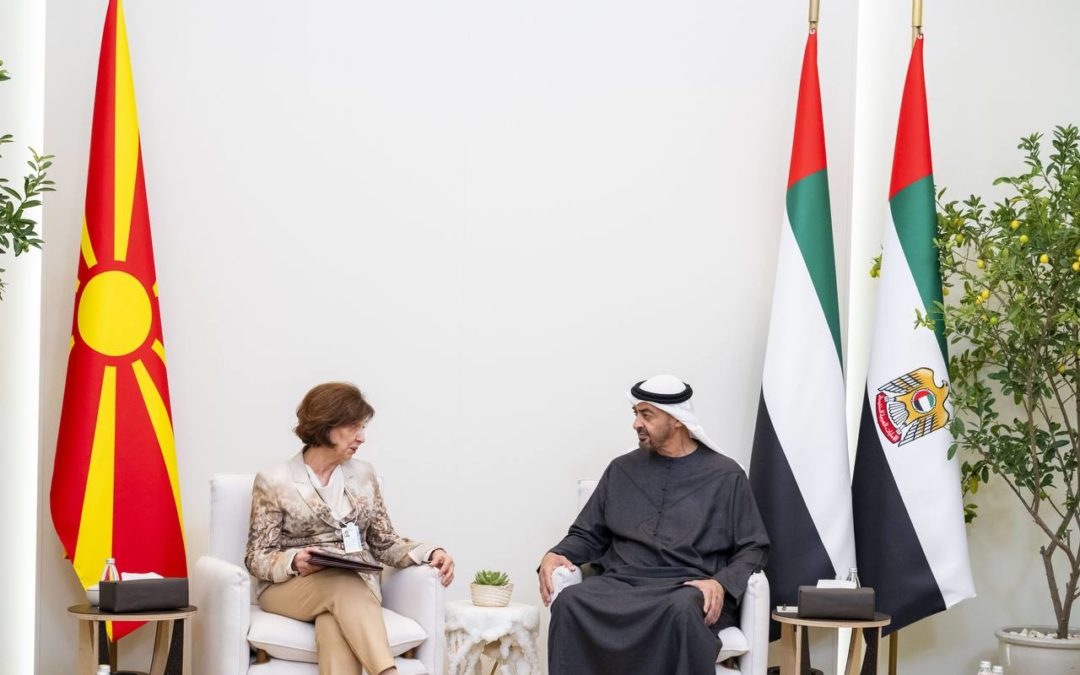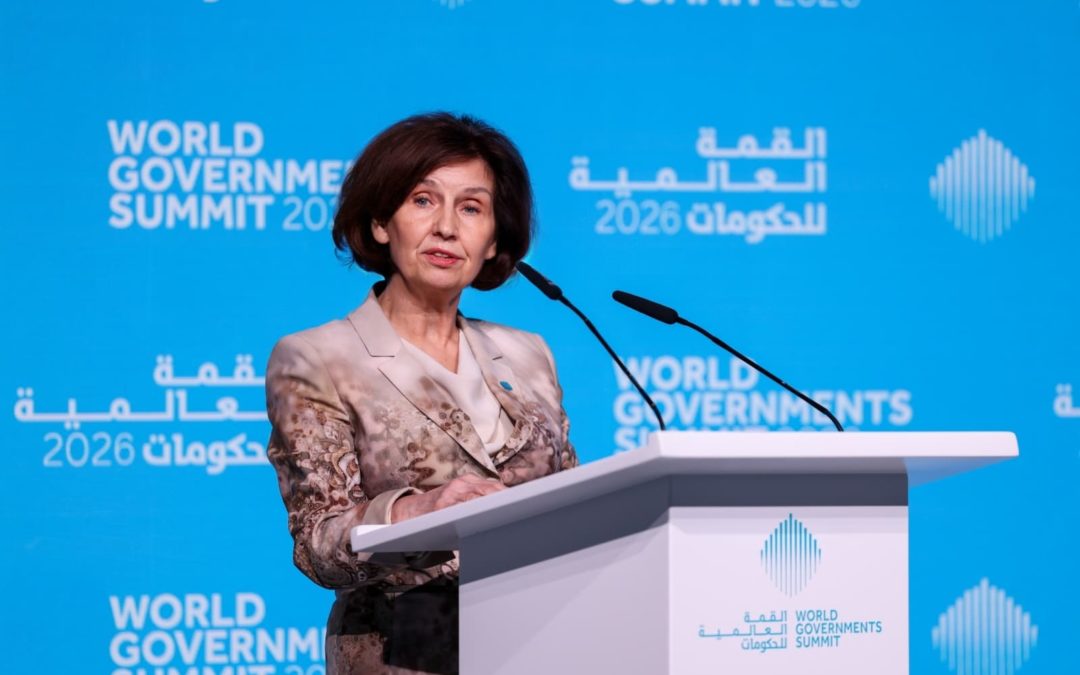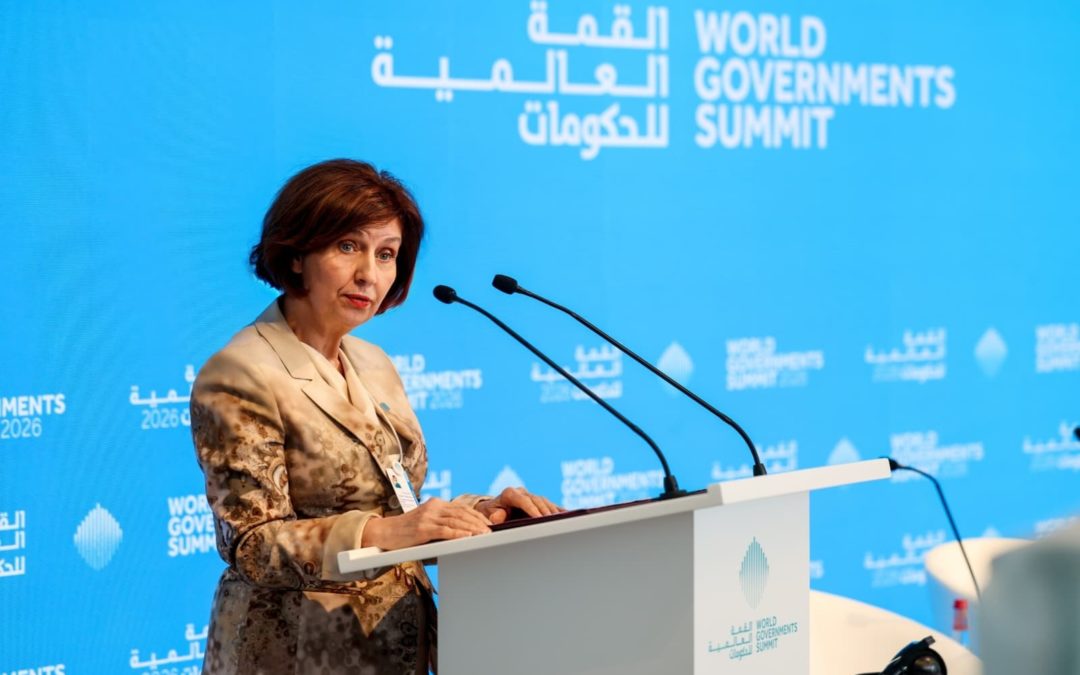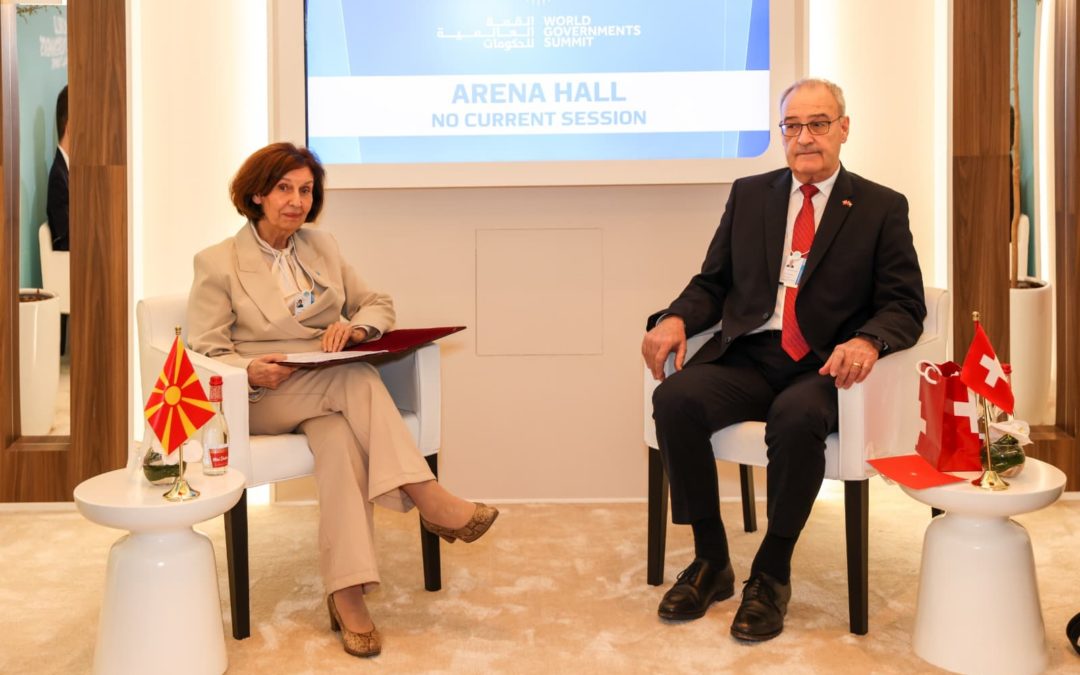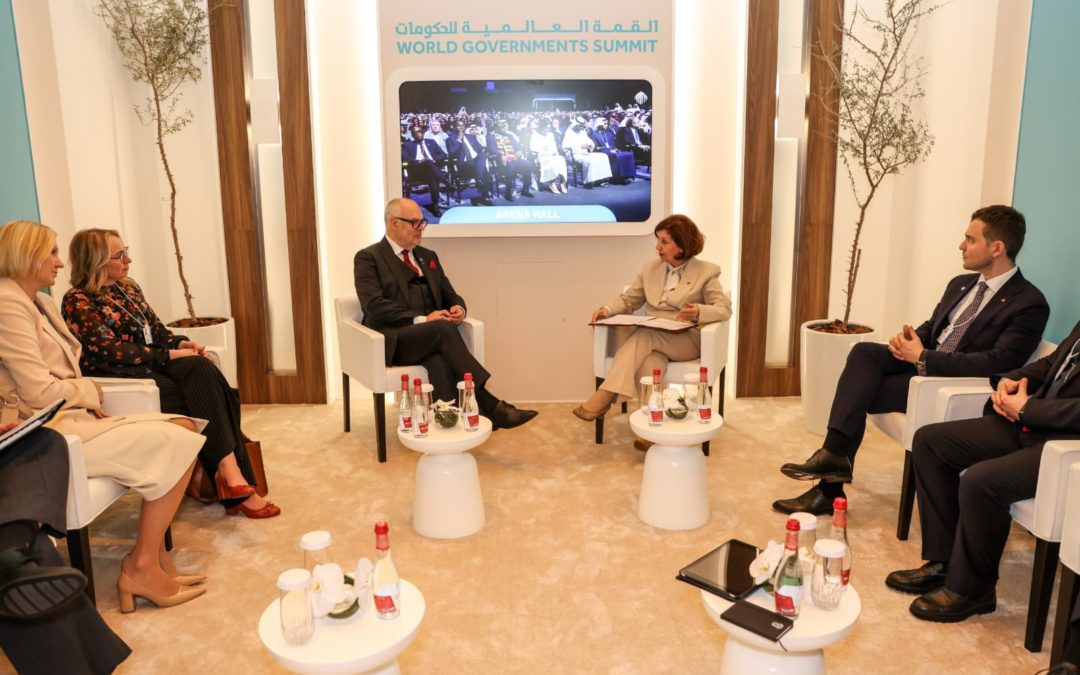Dear citizens,
Dear Speaker of the Assembly, Mr. Gashi,
Dear Prime Minister, Mr. Mickovski,
Dear Members of Parliament,
Dear Ministers,
Dear Representatives of the Judiciary,
Dear Representatives of Religious Communities,
Dear Chief of General Staff,
Dear Representatives of the Diplomatic Corps,
Representatives of the Media, Ladies and Gentlemen,
At the outset, some words about my philosophy for the Presidential Office.
I first addressed the citizens, regardless of any affiliation, in order to address my and your sovereign in Rousseau’s sense of the word: the citizen and the people as the demos, that is, a collection of individuals. Why? Because, without the demos, there is no democracy! In this sense, the Constitution says that “sovereignty emanates from the citizens and belongs to the citizens!”
It is my honor to address you seven and a half months after the election. Yet, it is a great responsibility to justify the legitimacy of 561,000 citizens. My principal task is to represent the Republic, at home and abroad, in the spirit of the constitution: as a sovereign, independent, democratic and social state.
I will try to present the most important of what I have done, but also to point out what has been initiated and what is to come, I will note the important challenges and dilemmas, I will offer possible solutions thereto, in the spirit of my program vision and mission.
First of all, building a standard European state, with a democratic political system, is my main goal. Freedom, law and justice are my ideology. Invoking and respecting national, European and international law are my political weapons. Defending the state and national interest is my basic political motive.
My basic political instrument in domestic politics was and remains the dialogue conducted with good will, based on arguments. In my opinion, the only effective and fruitful mechanism in international relations is the basic consensus on state and national issues, which always transcends party, ideology and personal interest.
In foreign policy, aware of the subordinate role of small states in international political relations, I regularly point to the obvious consequences of realpolitik: war and armament, as well as the eminent need to return and reaffirm peace concepts and international law, activate international organizations, institutions and courts, if we do not want to end up in neo-tribalism and self-destruction.
No one is innocent in this terrible reality, by action or inaction, i.e. by silent observation. The UN must not experience the fate of the League of Nations, allowing homicide and ecocide, as well as tolerating the gross violation of its basic documents: the Charter, the Universal Declaration of Human Rights and numerous conventions of the General Assembly and judgments of the court in The Hague. EU leaders, on the other hand, should never forget that the European Community was a peace project, which was supposed to guarantee eternal European Kant peace, although today the European countries are at war.
I know that realists will comment that it is strange when I criticize the EU for its attitude towards us, the geopolitically invented Western Balkans, because we aim at the EU, and not the EU towards us, but I, as Professor Joseph Weiler would say, have the right to think critically about it, about Europe, about the EU, as a Balkan woman who experiences herself as a European woman who expects European behavior from the EU towards us and towards the so-called “Western Balkans”.
For several months, at every multilateral or bilateral meeting, I have been stressing the necessity of expanding the EU with the countries of the so-called Western Balkans. I point to the logic of the EU doctrine of “unity in diversity”, as its modus vivendi, which cannot apply only to its members, but also to the candidates, and even to the candidates for candidates. Otherwise, there are neither negotiations nor talks. There is a eurocracy expressed in the formula: “listen, be silent and execute” because I have an unlimited right of veto!
But, I admit, for me, the EU is still the most desirable democratic political system and our home. Not by chance. Today, the citizens of the EU member states have a better opinion of its democratic capacity than that of their national authorities, with the sole exception of Luxembourg. This applies to France and Germany, too.
In numerous meetings with EU representatives, I point out some paradoxes: first, the European Community has been calling for the overthrow of authoritarian systems for decades, then, there is a moral obligation for solidarity with them/us after the fall of communism; second, the profit logic of Western economies requires a larger market and labor force, and we are here; third, the stability of the European continent also depends on the East, including the Western Balkans, as a geopolitical entity; fourth, located between Europe and the Middle East as a conglomerate of cultures and religions, the Balkans has always been perceived as a potential conflict zone; fifth, we, the Balkans and those before us have always perceived themselves as Europeans, so the European integration is incomplete without its European Southeast part.
It is time for a bold, fundamental EU step, following the example of the one from 2004, which will mark the reunification, i.e. reintegration of our region. I will tell you why. The Balkans are a natural part of Europe: geographically, historically and culturally. The European idea is a unique political philosophy supported by all political actors, parties, but also citizens in the region. EU membership will be a powerful motive for democratic changes in the region, which will permanently disable the threat and destabilization by frustrated nationalists and guarantee lasting peace. The full integration of the Balkans into the EU will put an end to the endless redrawing of borders, and, with it, the end of Balkanization as a phenomenon, erasing the borders between the Balkan states. And, in the end, the Western Balkans are no problem for the absorption capacity of the Union!
Some Western political scientists metaphorically write that the Western Balkans are the EU’s Achilles heel. If so, neither Paris nor Berlin should aim at it, and neither should Brussels.
Honestly, after a decade of absence of a strategy for the region, in the Growth Plan and in the reform agendas, and especially in our Reform Agenda, I recognize a strategic approach, but also specific reforms with deadlines and finances, which guarantees and stimulates the process on both friendly sides. That is why we must not allow either them or us, instead of realizing the strategic goals and challenges and reforms, to direct our energy and time towards history, in accordance with the Council Conclusions and the protocols, i.e. the minutes.
If we are talking about “Pacta sunt servanda”, let me point out that in the Treaty on Good Neighborliness and Friendship there is not a single word about constitutional amendments!
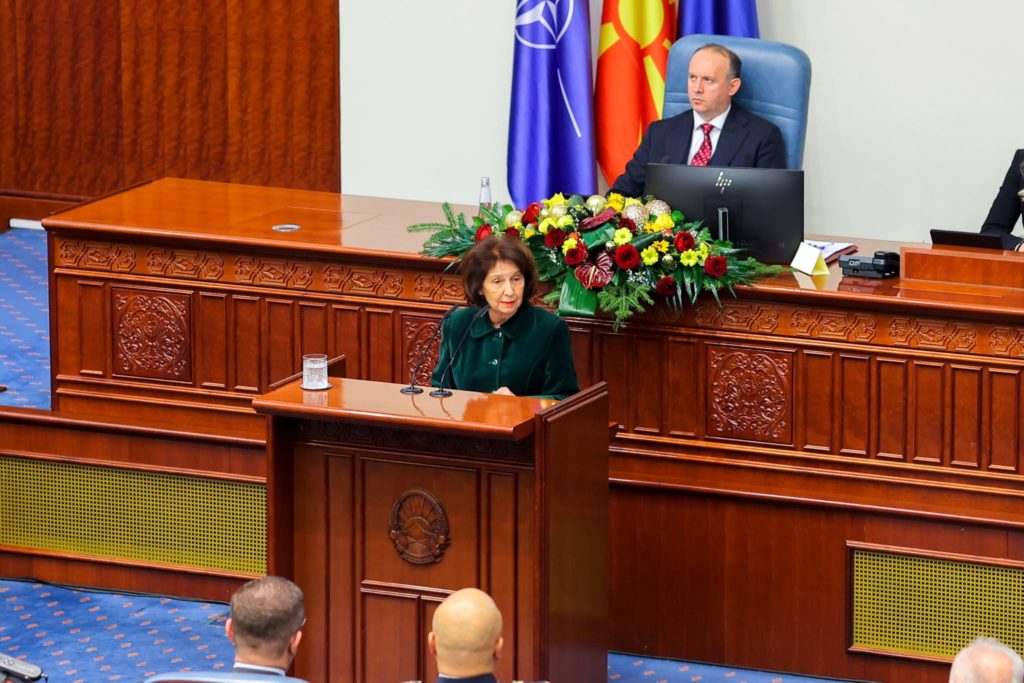
Let me say something regarding the defense and security.
It is no coincidence that the status of the President as “Commander-in-Chief of the Armed Forces” is guaranteed in a separate article, Article 79, paragraph (2) of the Constitution, and not in the list of competencies in Article 84 and Amendment XXII. The reason lies in the logical connection between the President, who personifies the state, and the armed forces that protect its territorial integrity and independence.
The short experience of being the Supreme Commander of the Armed Forces is long enough for me to understand why our army continuously enjoys the highest reputation among citizens. And from this rostrum, I express my due respect to our Army, to its military and civilian members. The regular reports of the previous and current Chief of the General Staff on the outstanding results and credibility of our participants in many military schools, missions and activities make me proud of them. I attended several military exercises and events and was impressed by the manifested military readiness and demonstrated skills. I visited the areas caught by the fires and saw the soldiers and officers facing the danger. I heard an extraordinary opinion about the expertise and competence of the top people of our army from our strategic partners and senior NATO representatives, demonstrated and proven in the education process, but also on the field, i.e. in action. I saw high recognitions and awards for the achieved results. I was impressed by the thoroughness of the reports, as well as the argumentation for the combat readiness of the army for 2024 by the Chief of General Staff, Mr. Lafchiski. I expect proposals from him very soon for rank promotion to generals. I wish there are women among them.
I have excellent cooperation with the Minister of Defense. We are both firmly determined to fight for better living and working conditions for the army, which, although small, is considered a professional and functional respected NATO army, capable of protecting the territorial integrity and independence of the Republic, in the conditions of the new and complex security environment, as well as to participate equally in important peacekeeping missions.
Still, I am not a fan on wars and weapons. Although I wish, like Hemingway, that we could say goodbye to them, I am nevertheless aware that the change in the doctrine of warfare imposes the need to adapt our Defense Strategy to global challenges.
This requires investments in defense, including in advanced technologies and weapons for compliance with NATO standards and the Common Security and Defense Policy of the European Union, that we implement.
I indeed prefer greater investment in environmental protection, education, science, health, culture, sports and social protection, i.e. in improving the lives of Macedonian citizens, but the regional, European, Middle Eastern and global reality, burdened with military and terrorist risks imposes other, unexpected needs and activities.
So, we can make the good defense system even better.
Progress in the Army must be based on clearly established and precisely standardized criteria, with an emphasis on expertise, competence and ethical standards. I must say, there is no interest or force that can force or convince me to sacrifice the rule of law.
Important link in the protection of the national security of the state, its economic and political interests, independence, sovereignty, constitutional order and fundamental freedoms and rights of man and citizen is the Intelligence Agency, which, in accordance with Article 2 of the Law on the Intelligence Agency, collects intelligence information on threats and risks from abroad.
After thirty years of male dominance at the highest level, i.e. male directors, driven by expertise and competence as primary conditions, but also by the new challenges for modern intelligence related to information technology, I decided to reach for changes, appointing two women to head the Agency, both from among those already employed in managerial positions. I was soon faced with a legally and ethically unfounded attempt to challenge my decisions on dismissals and appointments of managerial personnel in the Agency as discriminatory, imagine, on the basis of gender and political affiliation. However, the State Commission for Prevention and Protection against Discrimination adopted an opinion that there was no discrimination. From a female perspective, from my point of view, it is interesting that for 30 years of male management, there was no gender discrimination, but when two women were appointed as director and deputy director, gender discrimination “occurred”. I cannot understand the accusation of discrimination based on political affiliation, given the legal imperative for political neutrality in work, as well as the basic fact that both appointees held managerial positions at the time of the management of the previous initiator.
I made the appointments of managerial personnel guided by the principle of meritocracy. The best, not the party ones, are the most suitable for me and should be in the most responsible positions. I hereby repeat, I act as a lawyer in politics, not as a politician in law.
I would like to inform you about the motive that guided me in appointing the three members of the Security Council that I chair. Namely, I appointed: a doctor of law and an expert on European integration; Doctor of Meteorology and Climate Change Expert and Doctor of Economics and an excellent and esteemed expert on interethnic relations.
I decided to appoint an expert on European integration due to the frequent warnings about the danger of destabilization if we do not open negotiations with the EU now and immediately. I decided to appoint an expert on climate action because of chronic and acute pollution as a threat to national security. I decided to appoint an expert on interethnic relations because good interethnic relations were and are an important prerequisite for implementation of the planned reforms for progress and coexistence.
Let me reiterate, the Security Council can play an important role in the multidimensional approach to dealing with pollution. We must adapt our security, defense, energy, health and other systems to this multidimensional challenge.
The issue of pollution deserves exceptional attention, close cooperation with non-governmental organizations, establishment of a heterogeneous body and constant and coordinated work of the Government, the Parliament, the non-governmental sector, local authorities.
Before it is too late, we should also focus on digital security, i.e. deal with digital threats. Some of the key battles today are being fought on the digital battlefield, where prejudice and hatred are spread and key decisions are influenced through disinformation. Instead of passively waiting for a cyber-attack to happen, we must build resilience to digital threats and protect our critical digital infrastructure. We should also consider establishing an institution/organ/body that will take care of digital security, i.e. protection from the misuse of artificial intelligence to generate disinformation, steal personal data, discriminate against vulnerable populations, etc.
In my program, I highlighted the need to establish a Regional Center of Excellence for Women, Peace and Security for greater inclusion of women in the defense and security system. The fact that the Deputy Secretary General of NATO is Macedonian is an opportunity, in partnership with NATO, to make this idea become a reality with positive effects on the region, but also beyond.
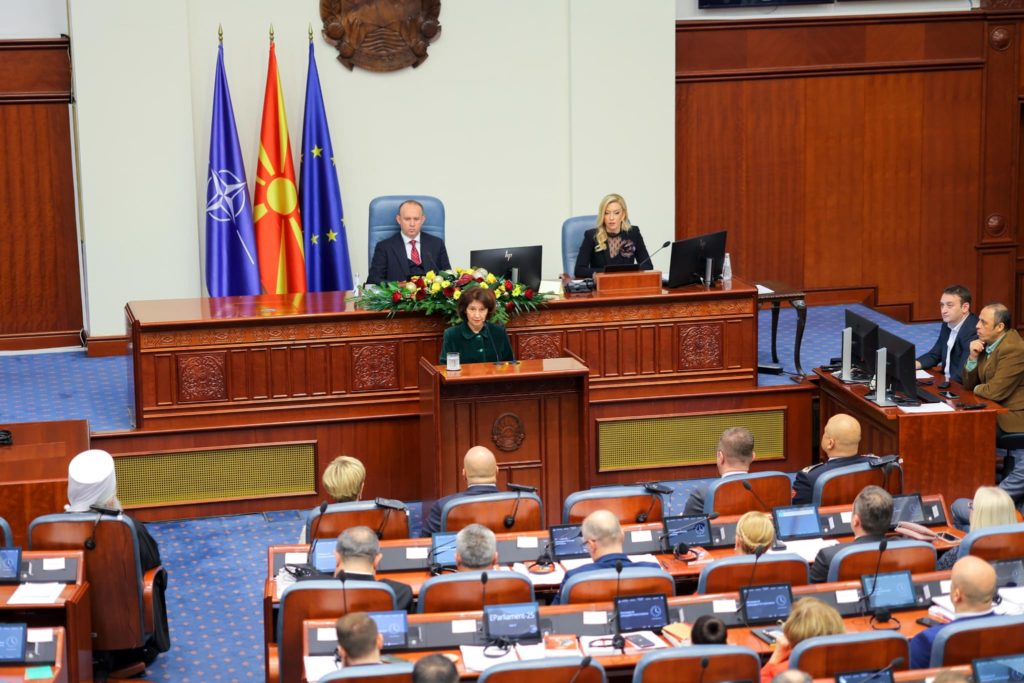
Regarding the foreign policy.
The EU membership was and remains a top Macedonian state interest and priority. Brussels is Macedonia’s strategic destination. Our foreign policy is fully aligned with the EU’s Common Foreign and Security Policy.
I believe that the European integration is a learning process not only for candidates, like us, but also for the EU, i.e. its members. I hope that, after 20 years, we have also learned the lesson that state interests here are built and defended consensually, as I already pointed out at the beginning, but also that the EU has realized, or it might seem to me that it has realized, that it must not repeat the mistake of the breakup of Yugoslavia, when it did not have a clear strategy for the region, appeared late, and did not firmly insist on a peaceful dissolution.
I believe that the path to Brussels can be made easier and faster if all of us: the President, the Parliament, the Government, the judiciary, the authorities, the opposition, the non-governmental sector, the media, function as a well-synchronized, practiced and experienced orchestra, whose repertoire regularly includes the symphony “Rule of Law” that we are to perform at the final concert in Brussels. However, the members of the orchestra, as well as the audience, need a deserved, standard valorization of what has been done by the European evaluators, through the prism of the most important constitutive documents of the EU: the Lisbon Treaty and the Convention on Fundamental Rights, but also the most important international documents to which the EU has acceded, such as the UN Charter and the European Convention on Human Rights. Or, to put it another way: have we harmonized our legislation with the European acquis and do we function on the basis of European standards, i.e. the Copenhagen Criteria? The coordinated performance of the Macedonian authorities in international relations is proof of a serious state and a statesmanlike political approach, while the opposite is proof of a weak state. The same applies to the consistency of positions. They are coordinated here, at home, and are defended by everyone abroad.
We, the Prime Minister, and the Minister of Foreign Affairs, and all other ministers build and coordinate positions at home, abroad we act as a harmonious trio and a choir. We have a position, we present it and defend it with arguments. Our positions, on the one hand, correspond to that of the majority of citizens, because we received the mandate from them, and on the other, they are based on the European and international law, refer to comparative and previous experiences and insist on a non-selective approach.
It is good to be coordinated and to coordinate with the opposition, because this will strengthen the negotiating and state position, but for that you need a statesmanlike profile and sacrifice on both sides.
Someone may not want to see it, or admit it, but I believe that the attitude towards us and our country is not the same as before: it is enough to follow the speech of the ambassadors, as well as the highest representatives of the EU, and compare it with that before and during the elections, and to notice the difference, if you want, of course. One of the most used words is debilateralization of the negotiation process, eliminating bilateral issues from the European integration. Honestly, it took time, knowledge and will to change the EU vocabulary and attitude. Believe me, there was no bilateral or multilateral meeting, debate, conference, at any level, at which we did not point out the danger of the virus of bilateralization, i.e. just one country with its moves to nullify the efforts and successes achieved in terms of the clusters and chapters and to keep us frozen or even to turn us back, without objective reason, only from a subjective, even irrational motive, which casts a shadow of uncertainty and discredits the process. We are not the only victim of the veto, and we will not be alone in this, but also those who stepped forward in opening and closing chapters and clusters. It can be said that the EU is also a real or potential victim of unanimity in inappropriate cases and situations, due to melting and loss of credibility. Still, in my opinion, the biggest victims are the values and principles of the EU, without which it is not or is not perceived as a superior, value-based community (polity). Our benevolent indications and warnings, based on profound elaboration and consultation with experts, came to understanding among our regional neighbors, who are not exempted, nor are they immune to the veto, but are directly affected, but also among many objective, thoughtful, democratically minded politicians, EU officials. Of course, the most vocal were and still are the experts of various think-tanks, non-governmental organizations specialized in the EU, intellectuals, free-thinking people, analysts, journalists. I indeed notice such tendencies both outside the EU and at home.
I notice similar tendencies outside the EU.
Our arguments, presented in a peaceful and friendly manner, bona fide, I think, are not only listened to, but also make you think. You have to be a self-proclaimed super European or a current apologist not to see the changes in the attitude towards the veto, the imagined or invented disputes, the blackmail, the bad intentions, the Euro-Mandarism.
Nonetheless, the EU’s attitude towards us directly depends on our attitude towards each other, towards the Copenhagen criteria, reforms, and our readiness for Europeanization. Economic, judicial, political, legal and other changes in the direction of harmonization with EU standards strengthen our credibility and push us closer to the EU.
It is important to accelerate European integration, but it is high time to act utilitarian, measuring the gains and losses of the steps, anticipating the consequences of repeating mistakes with the phenomenon: now, again this…. over and over again…
We must point out the unsustainability of paradoxes, contrary even to common sense and logic. If 16 times in 16 reports the European Parliament and the European Commission said “yes” to us, and the European Council said “no”, the problem is not our incompetence, but the EU’s democratic deficit. If in 15 reports no problem with a minority was noted, and suddenly, in the sixteenth, the problem with the minority appeared, the problem is challenging. If there are 14 judgments against Bulgaria in the Court of Human Rights in Strasbourg, and the EU has acceded to the European Convention on Human Rights and recognized its jurisdiction. How can a member state, which has signed and ratified the Framework Convention for the Protection of Minority Rights, or any other state, be tolerated for refusing to implement the judgments of the Court in which it has a judge? After all, the basic question is not whether a minority, or community, is mentioned in the Preamble, as half of the Constitutions in the world do not contain a preamble, but whether the normative text guarantees to every minority its minority rights. How can the EU allow its member state to not have a single word in its Constitution guaranteeing minority rights, even though they are guaranteed in Article 2 of the Lisbon Treaty along with human rights, and it asks us to change the constitution, even though our constitution, in Article 48 and Amendment VIII, guarantees broad protection of the rights of all communities, including Bulgarians and others, regardless of whether they are mentioned in the Preamble or not.
If the EU wants to be a philosophy, i.e. a community, and not a mere sum of parts (bureaucratic machinery), it must respect the fundamental values and principles not only when it comes to its members, but also the candidates. The Preamble to the Lisbon Treaty indeed states that solidarity will be deepened and the history, culture and traditions of peoples will be respected (paragraph 6 of the Preamble). This is the essence of the motto “unity in diversity”. Why are we asked to search for similarities, revising our history?
I point out to the Greek interlocutors, my friends, including the EU Ambassador, with my best intentions, that the Hellenic Republic has a legal and moral obligation when it insists on pacta sunt servanda, to refer Bulgaria and the European Council to Article 7 paragraph (3) which establishes the meaning of the word “Macedonia” as the “second party”, the nameless one, us, as: a territory and a people with its own history, culture and language. So, the previous ones have been put ad acta, i.e. resolved. Pacta sunt servanda What are we talking about with Bulgaria? About history, culture and language. So, what happened to pacta sunt servanda?
The European Convention on Fundamental Rights, as equal in importance and force to the Lisbon Treaty, a document with constitutional force, in the Preamble, also affirms respect for the different cultures and traditions of the European peoples and national identities
Article 4, paragraph (2) of the Lisbon Treaty, in turn, promotes equality of the member states, of their national identities, framed in the political and CONSTITUTIONAL STRUCTURES! On what basis do European officials ask us to change the Constitution in order to start negotiations?
Article 8 of the Lisbon Treaty, which refers to concluding agreements with neighbors on a reciprocal basis, is also relevant to our situation.
Let me remind what Mr. Caron also said: the importance of the fundamental values and principles for the EU is so great for the philosophy of the EU that Article 7 provides for a procedure for suspending the decision-making rights of a state that violates them. Why the EU member states have failed to point out this possibility to Bulgaria, not in our defense, but in defense of the constitutional document on which the EU is based?
I know, you can say that I have plunged into the European constitutional law, but imagine the shock of our students when they learn one thing and see another, when they believe in Kant, but Thucydides happens to them in the middle of the EU, even here!
Let me conclude. In a few months, our coordinated, proactive, constructive and pro-European foreign policy manifests potency and relevance. Maybe, at first, we sounded strange to them, unlike our predecessors maybe, but then they listened carefully and now we mention the same problems that require new solutions.
Let me read Article 49 of the Lisbon Treaty. It reads as follows:
- Any European country that respects the values set out in Article 2 may apply for membership.
- The conditions for the admission of new members shall be the subject of an agreement between the EU and the applicant. This agreement shall be ratified by all countries.
I intentionally refer to the very end. I must say that the question that sometimes is addressed to me: Will you change the Constitution? offends me both as a professor and as a president. You know my answer: the question is outside the EU constitutional norms, and I cannot and must not guarantee constitutional changes, because I am not an absolute monarch who does not respect the separation of powers and parliamentary democracy. The Constitution is carried out and changed only by you, who represent the citizens and you vote according to your own, not my, conviction.
However, we have proposed a solution even for an irrational request. By creatively interpreting the negotiating framework, i.e. the Conclusions, as I have heard both from parties and MPs in this composition, we believe that the only possible solution would be that of constitutional amendments with a suspensive effect established in the Constitutional Law on the Implementation of Amendments, which we have already applied several times, including the last case. In this case, vacatio legis would be binding, i.e. the amendment would enter into force after the completion of our negotiations and the ratification of the Treaty on our EU Membership. This would be a win-win solution for Bulgaria because it would achieve its request, but later, and in the meantime, it would help us in European integration, in the spirit of the Preamble to the Treaty on Good Neighborliness and Friendship, aware that the sooner our negotiations are completed, the sooner it will reach its goal. For us, a win would be the opportunity to deal with European reforms, instead of Balkan obstacles, and we would rush to complete the negotiations. For both countries, a win-win would be the strengthened friendship and proven good neighborliness. The Commissions would work according to the French-German, or German-Polish model, trying to understand the other. Otherwise, we risk facing new demands and conditions, under the threat of a veto.
Indeed, the EU can propose other creative solutions for interpretation both of the framework and the conlusions.
The bilateralization of the European integration is not only dangerous for the Macedonian case, but for the overall enlargement process. The Balkans are the birthplace of precedents. And every harmful precedent becomes the rule. Bilateralization will not end with the Macedonian case; on the contrary, I am sure and fear that it will inspire many other new cases. Even then, it will become the greatest danger to enlargement as the most important geostrategic investment in peace, security, stability and prosperity. The Balkan Pandora’s Box must not become European Pandora’s Box. The European Union has/had the opportunity precisely with the Macedonian case to prevent this harmful precedent from becoming a rule. I welcome the German-Slovenian initiative to avoid vetoes on bilateral issues, but also the criticism of all the others.
In meantime, it is good to look forward to the new solution.
I am not saying this in vain, but based on experience, i.e. active participation in dozens and dozens of bilateral and multilateral events, meetings with many presidents, prime ministers, speakers, high-ranking representatives of international organizations.
I have used and will use every opportunity, including professional contacts and friendships, to defend Macedonian positions and interests and expand the circle of partnerships.
Within the framework of regional cooperation, I call and stand for mutual understanding and support as a condition for understanding and support from others. Instead of blocking each other, we must support each other, because if we do not support each other, how can we expect others to support us? Otherwise, we will continue to confirm the imposed stereotypes and negative narratives about us, such as: powder keg, suburban states, periphery of the periphery.
I believe that Homo Balkanikus can also become Homo Politicus.
We can help each other a lot with cultural diplomacy. At this year’s May Opera Evenings in Skopje, I saw the magnificent Bulgarian performance of Wagner’s opera “The Valkyrie”, after which I received an invitation from the Director of the opera, academician and professor Plamen Kartaloff for a return visit of the Macedonian National Opera and Ballet in Sofia with “Nabucco”. I accepted it and went to Sofia, where I witnessed the enormous respect that the Macedonian art and culture enjoy in the Bulgarian society, in the packed hall and the long ovations for the Macedonian artists. But the most important epilogue of this is the magnificent publication by academician Plamen Kartaloff, entitled “The Role of the Bulgarian Opera in Cultural Diplomacy”, in which an entire section is dedicated to us, enriched with photographs, paintings, statements, his and my speech, articles in Bulgarian and Macedonian newspapers.
I informed the Bulgarian President about my visit and we arranged a meeting and planned to watch the opera together. Unfortunately, the plane tragedy in which a close associate and friend of his died made it impossible for him to come to the performance, and the incident with the flag overshadowed the pleasant conversations about future projects.
I still believe in cultural diplomacy. It builds two-way bridges that are resistant to daily political spin, populism, demagogy and manipulation. There is no greater success for a country and culture than to gain admirers, even lovers, among members of other nations.
In addition to the bilateral visits to Italy and Montenegro, I also participated in five important multilateral events. I represented the Macedonian positions on the global stage, at the 79th General Debate of the United Nations General Assembly, I gave a presentation to the Security Council, I met with Secretary-General Antonio Guterres, President Biden, and high-ranking representatives of international organizations. Most important for me is that my speech in New York aroused great interest and many participants refer to it. It is nice, during the reception and meetings with ambassadors who are not resident in our country, to hear that they have met you through the speech at the UN.
In Berlin, I participated in the Conference on the Reconstruction of Ukraine, and in Lucerne I spoke at the Peace Summit in Ukraine. I participated in the Climate Change Summit in Baku, where I shared our vision for solving some of the most pressing problems of today I have arranged and confirmed several meetings. The last one was confirmed by the President of the Turkish Parliament for a visit to Turkey.
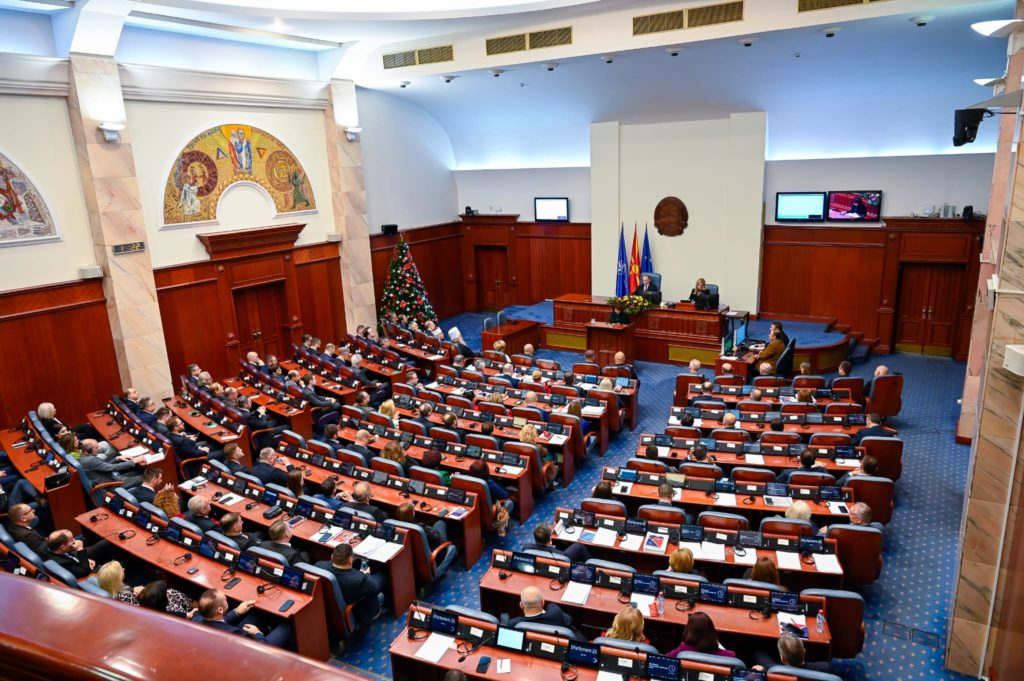
Couple of words on the domestic policy.
Although I have limited powers in domestic policy, as president of all citizens, I could not be a passive observer of the problems in society. I promised that I would be for the citizens, but also among the citizens and with the citizens. The citizens know that I am an interlocutor for their challenges and a companion in the fight for their rights. Therefore, 132 complaints reached me, of which over 62 are sent to the competent authorities. Complaints are not statistics, but human destinies. Responding to the complaints, the administrative mechanism for realization of the rights of citizens, guaranteed by the constitution and laws, is initiated.
The spatial arrangement of the premises in the city center is in a final phase where the people’s office will be located again. Moreover, we intend to organize mobile offices in the municipalities.
I believed and still believe that pardon is a human right, not a sanction, and that the degree of resocialization of the convicted person should be assessed. I considered and still consider that it is not good for the Pardoning Commission to have judges, public prosecutors and lawyers as members due to the risk of conflict of interest. Pardon is aimed at correcting the law with justice and ethics. A new Pardon Law is needed, a new way of communicating between the court and the Ministry of Justice, a new way of dealing with the requests for pardoning by judges, i.e. collecting and documenting the case and the profile of the convicted person applying for pardon, enabling visits by members of the Commission to prisoners seeking pardon. But, the penal policy must also be reconsidered, as well as the length of the pardoned period. This is a recommendation of the Council of Europe.
The Pardoning Commission will organize a meeting with all former members of the Pardoning Commissions for the purpose of exchanging experience, detecting problems, proposing solutions.
The Commission is meritocratic, respecting fair and appropriate representation in addition to expertise and competence, and parity gender representation.
In establishing the Commission for Decorations and Recognitions, which you have probably seen, I was guided by the criterion: the awarded should award. Its members are prominent scientists, professors, opera singers, painters, sculptors, actors. The basic criterion is expertise and competence, and then, fair and appropriate representation. For the first time, there are more women than men in the Commission.
I have constant cooperation with a large number of organizations in the field of culture, gender equality, marginalized groups, women farmers, students with hearing impairment, winners of prestigious awards in mathematics, physics, chemistry, sports…
I am a patron of important events, from children’s, such as the “Golden Nightingale” to celebrations of important anniversaries at universities, libraries, institutes, chambers of commerce.
I try, through speeches on the most important national holidays, such as Ilinden, ASNOM, or October 11, to reaffirm their immeasurable significance and to encourage our self-confidence, to call for unity and cohesion, for self-respect and respect for others, for the different…
I reiterate, a consensus is needed between the government and the opposition on the most important national interests. In this direction, I joined the debate on the Growth Plan and the Reform Agenda, I called for cooperation in the National Council for European Integration. I personally had a constructive meeting with the leader of the opposition, because I believe, and I think he believes too, that without the opposition there is no democracy.
I do not regret that I openly supported Radmila Sekerinska for the position of Deputy Secretary General of NATO. It was irrelevant whether I personally agreed with some of her previous political positions and decisions. It is important to have our representative, to seize the rare moment, for the region, for the small countries, to manifest unity around the support of a very important office. Without hesitation, together with the Prime Minister and the government, we stood behind her. We must learn to distinguish between state and party interests. It is illogical to support candidates of other countries when we have our own candidate, even if he/she comes from the ranks of the opposition. Just as it is illogical to cheer for someone else’s team at a match in which the Macedonian national team is participating.
In order to be able to progress, we must put an end to the self-destructive behavior that everything starts with us, that nothing before is good and does not apply, that the other is our enemy, not a partner, that we should be demonized instead of criticized. In this sense, the decision of the Parliament to adopt the National Development Strategy 2024-2044, even though it was adopted by the previous government, is to be welcomed. This is inspiring. The support of the opposition for the Reform Agenda of this Government is also to be welcomed.
Respected attendees,
Usually, at the end of each year, public opinion surveys are conducted through which decision-makers try to feel the pulse of the people. Of course, some are interested in the party rating, others in their personal rating. I, on the other hand, am interested in the problems of the Macedonian citizens. And one of the key is justice.
Justice is the strongest link between the state and its citizens. However, justice is threatened by endemic corruption and organized crime, which, together with the conflict of interest, nepotism and clientelism, nullify the rule of law, devalue institutions, evict young people and empty our country. Without justice, there is no certainty in planning life.
I appraise the fight against corruption and organized crime It is the most important fight. In this fight, we are not alone. We have the trust of the Macedonian citizens and the support of our strategic partners, including by adding to the blacklist. We are doomed if we do not see the darkness with wide open eyes and whiten it with sanctions. Now the competent Macedonian institutions are on the move. Citizens expected and received specific results. Any delay would mean tolerating lawlessness and injustice. No one must be untouchable. No one must be above the law. The entire society cannot suffer punishment due to the impunity of a few.
But the fight must by no means be reduced to these few high-profile cases because corruption is deeply rooted in every pore of society. The distrust of the judiciary is not accidental. The wise Lord Acton rightly concluded that: all power tends to corrupt; absolute power corrupts absolutely. Robert Hyslop, on the other hand, warned that in every country there is crime, but in the Balkans, criminals have their own countries.
Therefore, accelerated and deep reforms in the judiciary are needed. The Judicial Council and the Public Prosecutors’ Council must be true guardians of the independence of the judiciary and filter through which only the high-quality and uncorrupted will be able to pass. The restoration of the shaken trust of the Macedonian citizens in the judiciary depends on this. The fight for justice, for a legal state, for the rule of law is a fight to retain the youth and for the future of the state.
Respected Members of Parliament,
When I speak of justice, I do not mean only the judiciary and the rule of law. In order not to become a state of social cases, we need social justice. And in the Constitution, Macedonia is defined as a social state, which should help the vulnerable, so that every person, every family can have a decent and dignified life.
The budget that you, the Members of Parliament, adopted is developmental and investment-oriented, but with a social component included. That is to be welcomed, especially in this time of price shocks. Each of us should do everything we can to help vulnerable categories.
As I said, although my powers in this field are limited, I do what I can. I have become a voice for those who face systemic discrimination, such as textile workers or rural women who are fighting for more dignified working conditions. Due to gender inequality, many women unfairly bear a heavy, double burden – not only the home and family, but also the income.
We must integrate gender perspectives into every work. Gender equality is not an abstract ideal, but a fundamental assumption for sustainable security. We need to follow the rhythm of nature in which the 50:50 ratio exists. In my short time as president, I have applied this principle. For the first time in history, there are more women in the Pardoning Commission, and there is parity in the Youth Council. For the first time in history, a member of the Security Council appointed by the President is a woman. Also, for the first time in 30 years, the first and second person in the Intelligence Agency are women. I have a female adjutant, there are more women than men in the Commission for Decorations.
As an ally of women, youth, students, vulnerable groups, for the first time I have included a person with disabilities in the Youth Council. In the Pardoning Commission and in the Youth Council, for the first time, there is a member of the Roma community who is there not as a Roma, but as a top lawyer, a PhD in criminal law.
Why is all this important? Because caring for the poor, the vulnerable and the marginalized is the yardstick for measuring the true value of society. We must awaken solidarity and humanity within us and among us.
A word or two on environmental justice. I have already spoken about the deadly effects of air pollution that we breathe. The key polluter in our country is the energy sector. This legacy problem cannot be solved overnight. Recently, at the climate summit in Baku, in presenting the commitments that we have undertaken as a state, we discussed energy transition as well. I am aware that we have been offered assistance and I think that we should accept it.
I eagerly await the day when I will sign the decree promulgating the Law on Climate Action. It may lead to a turning point.
On this day, 25 December 1903, exactly 121 years ago, the most important book for us was published – “On the Macedonian Affairs” by Krste Petkov Misirkov. In it, Misirkov warns us that, as the cause of every failure, divisions push us into nothingness. And conversely, that unity is a prerequisite for every success and the basis for a bright future.
Misirkov also sketches the social contract, reminding us that “the people are nothing but a great friendship, based on blood kinship, on a common origin, on common interests. The remembrance of that kinship, that origin and those interests force every member of a nation to renounce some of their rights and interests in order to devote part of their strength to the common good. It is the debt to the national interests, for which the member of the nation receives protection of his personal interests where his own strength alone is not enough.”
That social contract, outlined by Misirkov, was concluded on 2 August 1944 with the formation of the ASNOM Macedonia, and was confirmed and renewed on 8 September 1991 with the proclamation of the independent Republic of Macedonia. At the core of that social contract is the conviction that our republic exists to ensure peace and coexistence, human rights and social justice, economic well-being and progress of personal and communal life.
Over the past three decades, that social contract has been forgotten. The common good has been appropriated and the public interest has been neglected. As a result, more and more young people have begun to perceive the homeland as a place for temporary residence, as a hotel, instead of a permanent home to start a family.
This process, of social contract, will not be easy. However, we must not give up; we must create conditions for young Macedonians, Albanians, Turks, Serbs, Roma, Vlachs, Bosniaks and others, to progress and succeed here, in our one common homeland.
Only if we put aside divisions and quarrels, narrow party and personal interests, and unite around the common good and public interest, will we succeed in renewing the social contract, and in making our homeland a decent place to live in for all its citizens, current and future.
Thank you.


